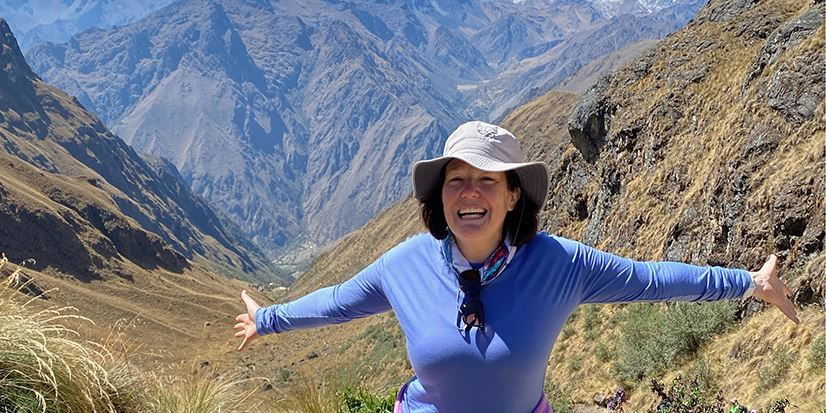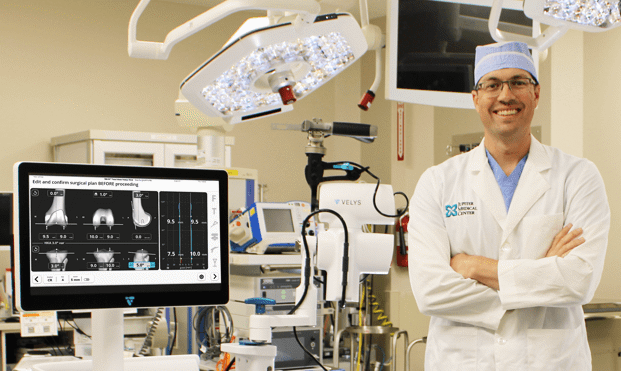Karen's Story
- Author: Karen Bell
- Category: Gastrointestinal Oncology Program


“ "Deciding to stop chemo and take that chance on HIPEC was very scary, but I had good friends and good doctors - that's what gets you through. Cancer really gives you a clarity about life, something that's given to you, whether you want it or not."”
Karen Bell, 48, airline flight attendant from Jupiter, Florida
Diagnosis History:
First colonoscopy (negative for cancer) at age 40 for unexplained anemia (note: national recommendation is to begin regular colonoscopies at age 45)
January 2020: One month after she developed stomach pain, her Jupiter Medical Center oncologist Dr. Andrea Katz diagnosed colon cancer and referred her to Dr. Dana Sands at the Cleveland Clinic, who identified a blockage in the colon and surgically removed a large tumor in February 2020. Karen then underwent post-surgery chemotherapy for 11 months.
February 2021: Dr. Katz noticed a spot on Karen’s diaphragm during a follow-up scan and referred her to Dr. Shanel Bhagwandin, surgical oncologist at Jupiter Medical Center. He performed robotic exploratory surgery and biopsied suspicious tissue on her diaphragm.
- Diagnosis: colorectal cancer that had spread to the diaphragm and abdominal cavity
- Recommendation: Two-phase treatment involving CRS, cytoreductive surgery to remove all visible cancerous tissue within the abdominal cavity, followed immediately by hyperthermic (heated) intraperitoneal chemotherapy (HIPEC), which involves flooding the open abdomen with heated cancer-fighting drugs to destroy remaining cells. Heating the drugs increases their absorption and minimizes side effects. The drugs are then washed from the body and the surgical incision is closed. Karen was released from the hospital six days later without the need for follow-up chemotherapy.
Karen’s thoughts/reactions:
The diagnosis: “It was very scary. I was completely shocked by my diagnosis, and I wasn’t even thinking about cancer because I’d had the clear colonoscopy at age 40. Colon cancer didn’t run in my family, although my mother died of lung cancer when I was 25.”
The HIPEC treatment: “I was in all the support groups for cancer survivors, and I had been researching cutting-edge treatments, including HIPEC, so I was ready when Dr. Bhagwandin recommended it. I guess I’m a risk taker. HIPEC is not for the faint-hearted, but when you’re diagnosed with a disease like this and have lived with it for two years, you have to advocate for yourself and rely on wonderful doctors who give you their professional advice. At my young age, I’d rather do the surgery than another year of chemotherapy.”
“Deciding to stop chemo and take that chance on HIPEC was very scary, but I had good friends and good doctors — that’s what gets you through. Cancer really gives you a clarity about life, something that’s given to you whether you want it or not.”
Karen’s recovery:
Immediately after surgery, she began walking daily.
“I’ve always been a walker, so I just walked and walked and walked. I did a four-mile loop through Jupiter, and I probably walked past all of my doctors’ houses every day because it’s such a small town.”
Two months later, the Alaska trip
At her post-surgery checkup, she asked Dr. Bhagwandin about the possibility of taking a long-planned Alaskan cruise with friends. He gave the go-ahead, as long as she promised not to lift anything heavy or engage in too much physical activity. She hiked but let her friends carry her luggage and other heavy items throughout the cruise.
“I was blinded by the beauty of Alaska. It was absolutely beautiful, and it was my 50th state to visit, so I was more than happy to do that.”
Four months later, the Inca Trail
As soon as her next cancer scan was scheduled, her good friend and former college roommate issued a challenge: if the scan is clear, let’s book the Inca Trail. The trip involves is a grueling 27-mile, escorted hike over two mountain passes to Machu Pichu’s legendary Inca ruins in Peru. The highest trail peak is 13,500 feet.
“My scan results came back clear, and I first asked my oncologist about doing the Inca Trail, and she said I was crazy,” recalls Karen. “I saw Dr. Bhagwandin the next day, and I told him, ‘Dr. Katz thinks this is an insane idea, but what do you think about me hiking the Inca Trail in September?’ He started chuckling immediately and said, ‘I love it that you’re asking me this. Go hike the Inca Trail, and send me a photo when you’re done.’”
She did both.
“We hiked it, and it was the hardest thing I’ve ever done. But it was also amazing. I later told Dr. Bhagwandin that it was harder than the HIPEC surgery. I willed myself over those mountains, and came back home and sent him a photo. He was gushing over me when he got the photo, and I forgot to gush over him, because he’s the one who saved my life.”
Her post-cancer mindset
“I generally have a pretty upbeat personality, and I have a large, wonderful group of friends. Even during COVID, we found ways to get together safely. When I was diagnosed with cancer, I just put one foot in front of the other. Just like the Inca Trail, you’ve just got to get through it, one step at a time.”
Current follow-up: Cancer scans every three months
